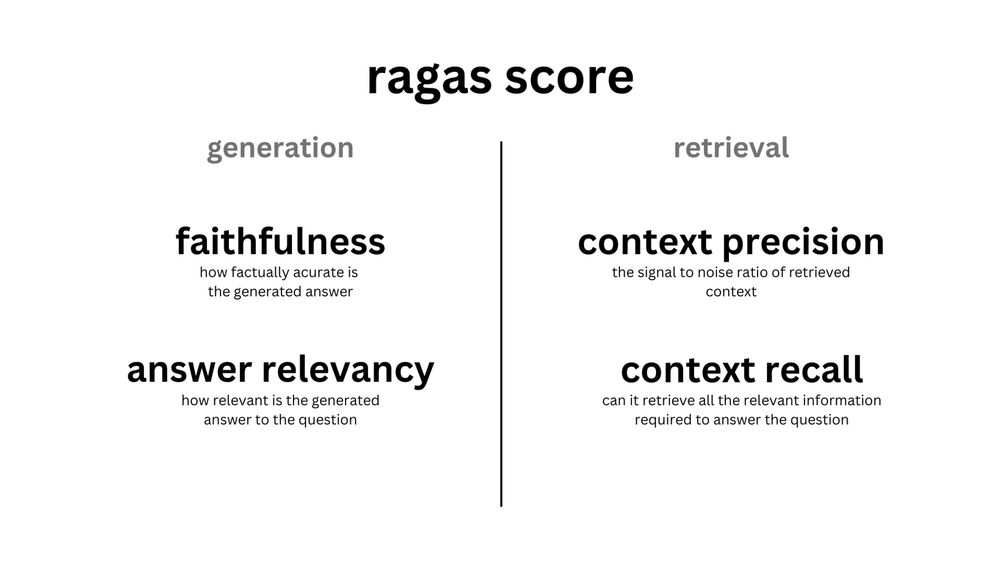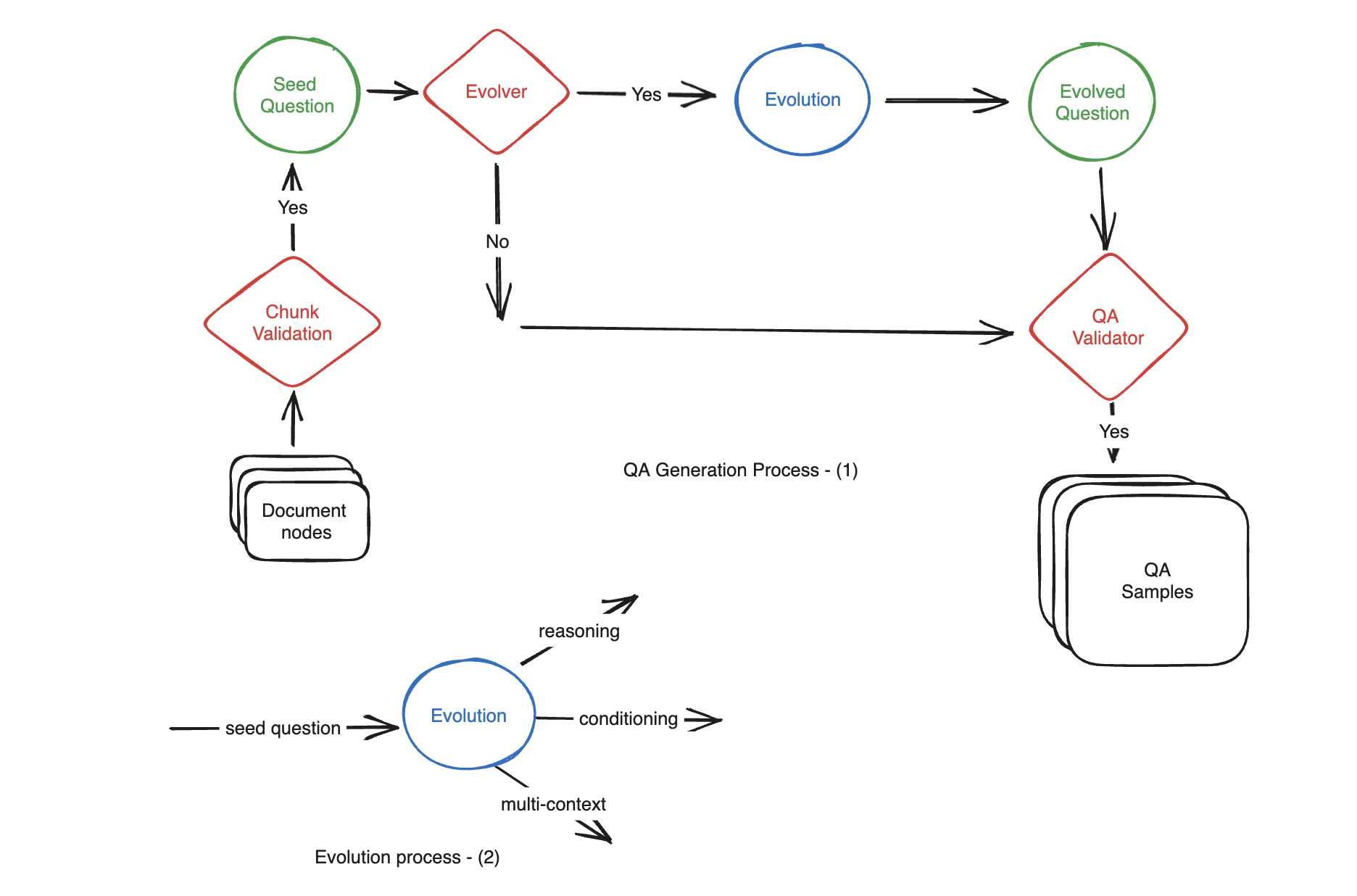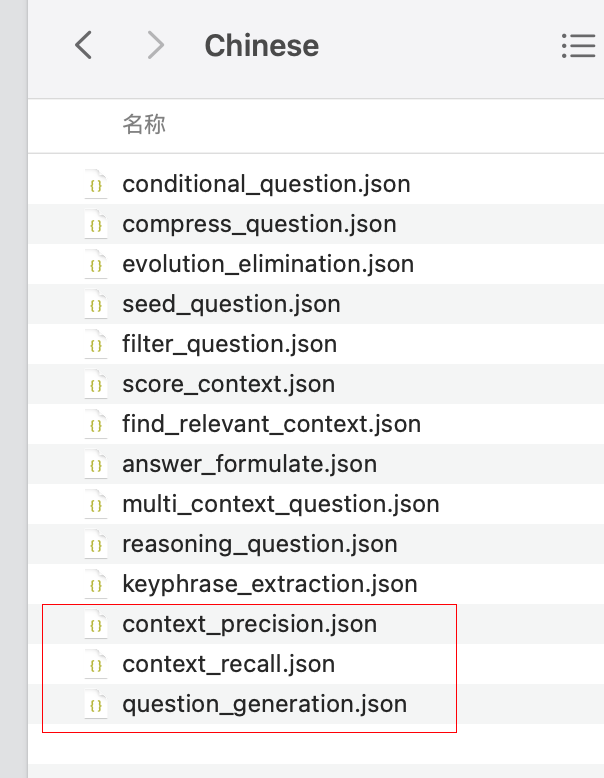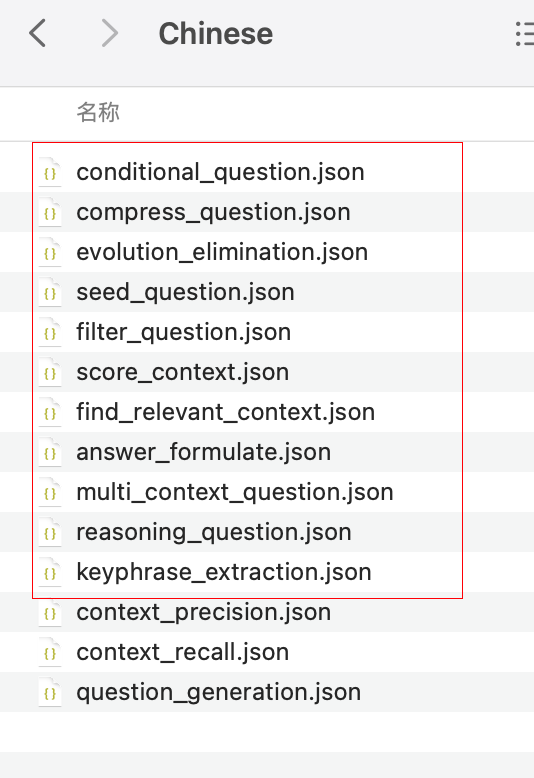Ragas
Quick Start
概念
| 概念 | 含义 |
|---|---|
| Question | |
| Contexts | Retrieved contexts:实际找到的Context |
| Answer | 最终生成的答案 |
| Ground truths | 参考答案 |
Dataset
from datasets import Dataset
data_samples = {
'question': ['When was the first super bowl?', 'Who won the most super bowls?'],
'answer': ['The first superbowl was held on January 15, 1967', 'The most super bowls have been won by The New England Patriots'],
'contexts' : [['The Super Bowl....season since 1966,','replacing the NFL...in February.'],
['The Green Bay Packers...Green Bay, Wisconsin.','The Packers compete...Football Conference']],
'ground_truth': ['The first superbowl was held on January 15, 1967', 'The New England Patriots have won the Super Bowl a record six times']
}
dataset = Dataset.from_dict(data_samples)
Metric

| Metric | |||
|---|---|---|---|
| Context Precision | Retrieval | Question | 是否跑题:检索结果 与 Quesion 是否相关 |
| Answer Relevance | Anwser | Question | 是否跑题:生成的答案 是否与 Question 相关 |
| Faithfulness | Anwser | Retrieval | 是否参考引用:生成的答案 是否忠诚于 检索结果 |
| Context Recall | Retrieval | 参考答案 Ground Truth | 检索的准确性: 检索结果 与 参考答案 是否相关 |
Prompt
Context Precision
Given question, answer and context verify if the context was useful in arriving at the given answer. Give verdict as "1" if useful and "0" if not with json output.
The output should be a well-formatted JSON instance that conforms to the JSON schema below.
……
Your actual task:
question: 法国的首都是什么?
context: 巴黎是法国的首都。
answer: 巴黎
verification:
Answer Relevancy
这个Prompt看不懂
Generate a question for the given answer and Identify if answer is noncommittal. Give noncommittal as 1 if the answer is noncommittal and 0 if the answer is committal. A noncommittal answer is one that is evasive, vague, or ambiguous. For example, "I don't know" or "I'm not sure" are noncommittal answers
……
Your actual task:
answer: 巴黎
context: 巴黎是法国的首都。
output:
Faithfulness
Create one or more statements from each sentence in the given answer.
……
Your actual task:
question: 法国的首都是什么?
answer: 巴黎
statements:
Your task is to judge the faithfulness of a series of statements based on a given context. For each statement you must return verdict as 1 if the statement can be verified based on the context or 0 if the statement can not be verified based on the context.
……
Your actual task:
context: 巴黎是法国的首都。
statements: ["\u6cd5\u56fd\u7684\u9996\u90fd\u662f\u5df4\u9ece\u3002"]
answer:
Context Recall
Given a context, and an answer, analyze each sentence in the answer and classify if the sentence can be attributed to the given context or not. Use only "Yes" (1) or "No" (0) as a binary classification. Output json with reason.
……
Your actual task:
question: 法国的首都是什么?
context: 巴黎是法国的首都。
answer: 巴黎
classification:
生成合成数据
动机:从文档手动创建数百个 QA(问题-上下文-答案)样本可能既耗时又费力。使用LLM来自动生成。
分成几类:simple, reasoning, conditioning, multi-context
这几类叫:evolutions

生成时,指定这三类的比例。
from ragas.testset.generator import TestsetGenerator
from ragas.testset.evolutions import simple, reasoning, multi_context
from langchain_openai import ChatOpenAI, OpenAIEmbeddings
# documents = load your documents
# generator with openai models
generator_llm = ChatOpenAI(model="gpt-3.5-turbo-16k")
critic_llm = ChatOpenAI(model="gpt-4")
embeddings = OpenAIEmbeddings()
generator = TestsetGenerator.from_langchain(
generator_llm,
critic_llm,
embeddings
)
# Change resulting question type distribution
distributions = {
simple: 0.5,
multi_context: 0.4,
reasoning: 0.1
}
# use generator.generate_with_llamaindex_docs if you use llama-index as document loader
testset = generator.generate_with_langchain_docs(documents, 10, distributions)
testset.to_pandas()
读取数据
官方使用LangChain,继续使用LangChain,不容易有问题。
自动语言适配
评估
将评估过程中使用到的Prompt翻译成中文,使用gpt-4-turbo-preview模型;缓存到本地。
The prompts belonging to respective metrics will be now automatically adapted to the target language.
The save step saves it to
.cacha/ragasby default to reuse later.
# 将Metric中的Prompt翻译成中文
from datasets import Dataset
# from langchain.chat_models import ChatOpenAI
from langchain_openai import ChatOpenAI, OpenAI
from ragas.metrics import (
answer_relevancy,
faithfulness,
context_recall,
context_precision,
answer_correctness,
answer_similarity,
)
from ragas import evaluate
from ragas import adapt
eval_model = ChatOpenAI(model="gpt-3.5-turbo", temperature=0)
# llm used for adaptation
openai_model = ChatOpenAI(model_name="gpt-4-turbo-preview")
# openai_model = OpenAI(model_name="gpt-4-0125-preview", temperature=0)
adapt(
metrics=[
answer_relevancy,
# faithfulness,
context_recall,
context_precision,
answer_correctness,
# answer_similarity,
],
language="Chinese",
llm=openai_model,
)
# Eval
dataset = Dataset.from_dict(
{
"question": ["法国的首都是什么?"],
"contexts": [["巴黎是法国的首都。"]],
"answer": ["巴黎"],
"ground_truths": [["巴黎"]],
}
)
print(dataset)
results = evaluate(dataset, llm=eval_model)
print(results)
生成的缓存数据

生成合成数据
from ragas.testset.generator import TestsetGenerator
from ragas.testset.evolutions import simple, reasoning, multi_context,conditional
from langchain_openai import ChatOpenAI, OpenAIEmbeddings
# generator with openai models
generator_llm = ChatOpenAI(model="gpt-3.5-turbo-16k")
critic_llm = ChatOpenAI(model="gpt-4")
embeddings = OpenAIEmbeddings()
generator = TestsetGenerator.from_langchain(
generator_llm,
critic_llm,
embeddings
)
# adapt to language
language = "Chinese"
generator.adapt(language, evolutions=[simple, reasoning,conditional,multi_context])
generator.save(evolutions=[simple, reasoning, multi_context,conditional])
生成的缓存数据

dataset中的字段
- question
- contexts:检索到的Context
- ground_truth:参考答案
- anwser: 生成的答案
- Question: A set of questions.
- Contexts: Retrieved contexts corresponding to each question. This is a
list[list]since each question can retrieve multiple text chunks. - Answer: Generated answer corresponding to each question.
- Ground truths: Ground truths corresponding to each question. This is a
strwhich corresponds to the expected answer for each question.
暂时没有使用到参考context
metrics=[
# 这几个都不需要原始的context
context_precision,
answer_relevancy,
faithfulness,
context_recall,
],
使用BGE
from ragas.llama_index import evaluate
flag_model = HuggingFaceEmbeddings(model_name="BAAI/bge-small-en-v1.5")
query_engine2 = build_query_engine(flag_model)
result = evaluate(query_engine2, metrics, test_questions, test_answers)
集成LangSmith
设置环境变量
export LANGCHAIN_TRACING_V2=true
export LANGCHAIN_ENDPOINT=https://api.smith.langchain.com
export LANGCHAIN_API_KEY=<your-api-key>
export LANGCHAIN_PROJECT=<your-project> # if not specified, defaults to "default"
创建跟踪器
# langsmith
from langchain.callbacks.tracers import LangChainTracer
tracer = LangChainTracer(project_name="callback-experiments")
Evalue时使用
from datasets import load_dataset
from ragas.metrics import context_precision
from ragas import evaluate
dataset = load_dataset("explodinggradients/amnesty_qa","english")
evaluate(dataset["train"],metrics=[context_precision],callbacks=[tracer])
集成LlamaIndex
官方文档有问题。